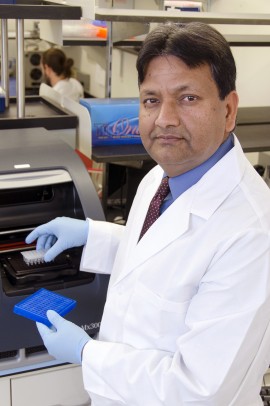University Scholar Subhash Pandey
The University Scholars Program, now in its 35th year, honors faculty members for superior research and teaching, along with great promise for future achievements. The award provides $15,000 a year for three years.

Subhash Pandey
Professor of psychiatry, anatomy and cell biology
Director of the UIC Alcohol Research Center
Senior research career scientist, Jesse Brown VA Medical Center
Years at UIC: 33
What are your research interests?
My area of research is the neurobiology of alcohol use and anxiety disorders. I am engaged in investigating the epigenetic and molecular basis of AUD and anxiety disorder. My lab investigates the mechanism by which alcohol drinking alters epigenetic processes to mediate changes in gene expression in the brain and, thereby, behavioral phenotypes. I believe alcohol is an epigenetic drug, as it can inhibit histone deacetylases and DNA methyltransferases in the brain. My research has been consistently funded by the NIH since 1996 and by the Department of Veterans Affairs since 1999. I established the NIH-funded Alcohol Research Center entitled, “Center for Alcohol Research in Epigenetics” (CARE) at UIC in 2015. It is important to point out that this is the only alcohol research center in the United States that is investigating the epigenetic mechanisms of AUD. The center at UIC uses both preclinical and translational research around a mission to define the biological mechanism of AUD and find a cure for the disease.
How did you become interested in these topics?
My early research was on biomarkers and neuromechanisms of psychiatric disorders. While working, I realized that alcohol use and abuse is the gateway to several diseases within the brain, including anxiety and depression. I then became interested in the basic question of how acute or chronic drinking produces changes in biological pathways that are responsible for hijacking the brain toward the pathway of addiction. Also, I wanted to help the community through my research, as AUD is a major global health burden. I have since been focused on the mission to find molecular targets in the brain that can be used to develop better and improved therapy to treat or prevent alcohol addiction.
What do you teach?
My teaching centers on the neurobiological and epigenetic basis of alcohol use and anxiety disorders.
How do you balance teaching and research?
Teaching and research are highly interconnected. I utilize findings from my own research and current research from the field to continually update my teaching materials. I believe that day-to-day research promotes better teaching, as students and trainees benefit from new knowledge emerging from cutting-edge research.
What’s your advice to students who want to focus their future careers on research?
My advice to students is to focus on your objectives and always seek innovative ideas and methods to answer your scientific questions. As a career scientist, staying at the forefront of research is the best way to get ahead and build your career.
